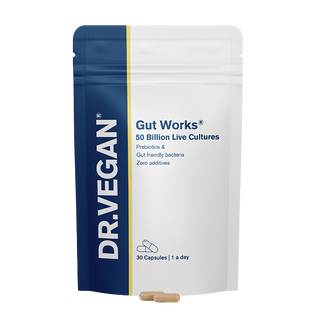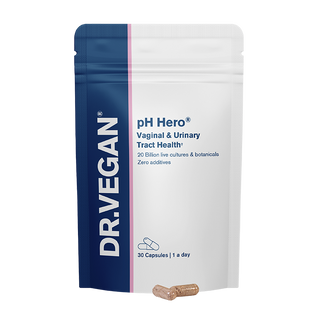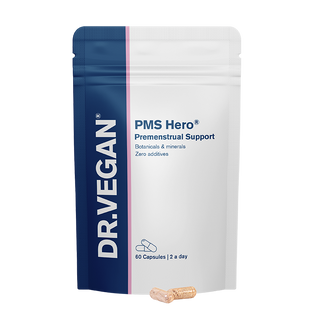Vaginal Microbiome: How your gut and vagina are linked

The gut and vagina are two separate organs located in different parts of the body, yet there is an intimate relationship between the gut and the vagina, in what is known as the 'gut-vagina axis'. In the same way the 'gut-brain axis' refers to the connection between the gut and the brain, the 'gut-vagina axis' refers to the complex communication and feedback system between the gut microbiome (also called 'gut flora') and the vaginal microbiome, which influences vaginal health and your overall health and well-being.
The gut and vagina both host their own unique microbiome - a microbiome is a collection of organisms and bacteria in a particular environment. Some types of bacteria should only be found in the gut, not the vagina. If these bacteria are introduced into the vagina, they can cause infections of the vagina and urinary tract. However, there is also a positive connection between the gut and vagina, and most good lactobacillus probiotics living in the vagina originate from the gut.
Our experts explain the connection between the gut and vagina, and common causes of yeast infections, bacterial vaginosis and urinary tract infections (UTIs).
What's your diet missing? Find out in your free Diet Profile.
What is the Microbiome?
The microbiome comprises a diverse range of microorganisms, including good bacteria, bad bacteria, viruses and fungi, that work together to maintain a healthy environment. The gut microbiome is primarily responsible for digesting food and absorbing nutrients, which in turn fuel our energy, mental health, our brain's performance, immunity and our whole body. In contrast, the vaginal microbiome plays a crucial role in maintaining the pH balance of the vagina and preventing harmful bacteria from taking hold, both in the vagina and urinary tract.
Our gut microbiome is responsible for 70% of our immune system, it is the most important microbiome for protecting us against IBS, bloating, food intolerances and digestive issues, and it is vital to our mental health and brain performance through our gut-brain axis.
The Gut and Vaginal Microbiome: How are They Linked?
A few mechanisms, including the immune system, hormones and nerve pathways, connect the gut microbiome and the vaginal microbiome.
When the gut microbiome is compromised, it can have a ripple effect on the vaginal microbiome. Poor gut health can lead to inflammation and an overgrowth of harmful bacteria, which can then travel to the vaginal area and disrupt the delicate balance of the vaginal microbiome. This can lead to various issues including yeast infections, bacterial vaginosis (BV), and urinary tract infections (UTIs). Our latest vaginal health consumer survey of over 1,200 women revealed that one-third of the women experienced vaginal infections, including bacterial vaginosis (BV), urinary tract infections (UTIs), or thrush, with over 10% dealing with these issues daily.
Can Bad Gut Health Cause Yeast Infections?
A yeast infection is a fungal infection caused by an overgrowth of a type of yeast called 'candida'. Candida originates from the gut. Candida can grow uncontrollably, leading to an infection known as 'thrush'. Symptoms of a vaginal yeast infection may include itching, burning and discharge.
Can Bad Gut Health Cause UTIs? (Urinary Tract Infections)
A urinary tract infection (UTI) is a type of infection that can occur anywhere along the urinary tract, including the bladder, urethra, ureters and kidneys. It is commonly caused by the bacteria called 'E.coli'. E.coli originates from the gut. Symptoms of a UTI may include frequent or painful urination, a strong urge to urinate, cloudy or strong-smelling urine, and pain or discomfort in the lower abdomen or back. If left untreated, a UTI can lead to more severe complications, such as kidney damage and sepsis, so you must visit your doctor if you have any of these symptoms.
Can Bad Gut Health Cause BV? (Bacterial Vaginosis)
Bacterial vaginosis (BV) is a common vaginal infection that occurs when an imbalance in the natural bacterial population resides in the vagina. Usually, a healthy vagina has a balance of different bacteria. Still, when the balance is disrupted, it can lead to the overgrowth of harmful bacteria. The symptoms of BV can include a thin, greyish-white vaginal discharge with a foul odour, itching, burning, and irritation in and around the vagina. Certain factors can increase the risk of developing BV, such as douching, having multiple sexual partners, and not using a condom during sex.
Create your free Diet Profile and understand your diet.
What can trigger a disruption in the vaginal microbiome?
Many triggers can disrupt the vaginal microbiome and lead to pH imbalance. Some of the most common triggers include unprotected sex, period blood, stress, and certain foods. For example, consuming a diet high in sugar and refined carbohydrates can feed harmful bacteria and disrupt the delicate balance of the vaginal microbiome. Continue reading about the role of nutrition in vaginal and bladder health.
You may also enjoy reading the effects of stress and anxiety.
Eating for Your Microbiome
A change in the gut flora is another significant risk factor for a shift in the vaginal microbiome. Thankfully, a few diet tips can help keep your gut microbiome in check:
- High Fibre Diet: A fibre-rich diet provides a food source for the probiotics in your gut. Fibre-rich foods include vegetables, fruit and whole grains.
- Probiotics: Only 29% of the women surveyed in our latest consumer survey currently take a probiotic to support their vaginal health, despite the significant connection between the gut microbiome and the vagina. Probiotics can be found both in foods and supplements, including pH Hero®, a complete vaginal health formula with 5 clinically studied probiotic strains, Cranberry, Sea Buckthorn, Parsley and Nettle that protect the vagina against unwanted bacteria, UTIs and BV. Fermented foods including yoghurt, sauerkraut, kefir and kimchi, are all sources of probiotics. 77% of customers feel the difference with pH Hero®*.
- Cranberry: Cranberries provide proanthocyanins, which work in the gut to prevent E.coli bacteria from clinging onto the tissues of the vagina and urinary tract. You may be interested in trying our Cranberry Refresher Mocktail recipe.
- Low sugar diet: Excess sugar can reduce the function of the immune system and encourage the growth of yeasts and harmful bacteria in the gut. Avoid foods with added sugar, and don't add any to your food and drink. Learn more in 'symptoms of high and low blood sugar'.
*Based on a UK survey conducted by DR.VEGAN® of 68 customers, nationally representative, during May 2024. All customer survey findings reflect our own efforts and have not been influenced or verified by any external organisations or third-party entities.
You may also enjoy reading:
- What is vaginal atrophy?
- Latest gut health research: IBS causes & symptoms revealed
- Why you should improve your gut health
- What is period poo?
- The surprising life impacts of PMS
- What PMS type are you?
- Nutrition for PMS symptoms
Discover our range of award-winning vegan probiotics, vitamins and supplements.
Want to hear more from our nutritionists? Sign up to our email newsletter for insights and exclusive offers:






















